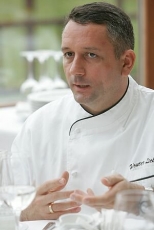WEST EAST RELATIONS
|
Increasing numbers of Western chefs are looking to Asia to offset the dreary economies of the US and Europe, but the recipe for Eastern success depends on more than simply exporting expertise. "What works in New York does not necessarily work in Hong Kong," said Sandeep Sekhri, whose company Dining Concepts manages a stable of restaurants in the Chinese city and Macau that include ventures with Mario Batali and New York chef Michael White. Batali last year opened a $3.2 million version of his famed New York family-style restaurant Lupa, situated in Hong Kong's high-rent Central district. Like its Manhattan counterpart, it offers dishes such as Ricotta Gnocchi with sausage and fennel, or veal-lined Saltimbocca. But its glossy take on Roman trattoria fare makes for a higher-end ambiance. "People in Asia expect a higher comfort level, it needs to be a little bit more plush," said Sekhri, who is managing director of Dining Concepts and says more Batali projects are in the pipeline. With Asia's economies in better shape than those in the eurozone or the United States, "someone who wouldn't speak to us three, four or five years ago is now much more willing to talk", said Sekhri of the so-called "celebrity chefs". The company, which last year posted gross annual revenue of $65 million, also boasts ventures with Michelin-starred chefs Sergi Arola from Spain and Australia's Greg Malouf. "The bigger the names the higher the expectations. We try to do a family-style trattoria with Lupa, but people compare us to a three (Michelin) star restaurant -- which was totally not the price point or the idea." Batali has also recently opened two restaurants at Marina Bay Sands in Singapore, where casino investments have helped lure the likes of French master Joel Robuchon, US-based Wolfgang Puck and Australia's Tetsuya Wakuda. -- 'Explosion' of chefs -- Singapore's dining scene has seen radical change, in stark contrast to the street cuisine of chilli crab and chicken rice it is more famous for, with some in the industry saying expansion has been too fast. "Singapore had a massive explosion of Michelin star chefs because of the casinos," said Yenn Wong, owner of Jia Boutique Hotels, which operates restaurants and bars in the city and in Hong Kong, as well as a Shanghai hotel. "There's now an oversupply of restaurants making it a very challenging environment. Some are just so expensive and not what a typical Singaporean can afford." Wong recently teamed up with British chef Jason Atherton, another Michelin starred chef and a protege of Gordon Ramsay with restaurants in Singapore, to open 22 Ships, a Hong Kong tapas joint that has created both buzz and long queues in its first months. "Sometimes you never know whether it's going to be difficult working with big chefs," said Wong, adding that Atherton's understanding of the Asian palette and market has been crucial to his success. "The dishes aren't very heavy, they're clean which suits Asian tastes, they're easy to understand. There is a creative twist but not too much." Wong contrasts it to one of her first projects, a Hong Kong restaurant called Opia that offered Australian cuisine but which has since closed down. "When we first opened there was a very good response. After two years it started to tail off, because you can't really pinpoint what 'modern Australian' cuisine is. We learned and decided to focus more." -- 'Everyone wants to be at the top'-- Even if the food is right, transplanting a chef into a new kitchen thousands of miles from home can be tricky. It is not just the menus that need to be adapted. "In terms of having a new kitchen crew, that's a huge change for, say, a chef coming from New York," said Sekhri. "There are five different languages being spoken in the kitchen for a start." At 28 years old, Vincent Lauria is head chef with IHM Group in Hong Kong, which operates a cluster of restaurants including the Italian Linguini Fini in Central. He quit Batali's upscale Babbo restaurant in New York for an opportunity to work in Asia in 2009 before being approached by IHM. "When I first came to Asia, I still had the New York mentality and I was very aggressive," he said. "In New York it is so competitive and cut-throat. Everyone wants to be at the top, everyone wants your position. Here you have to look after people, nurture your staff as they get used to your recipes." Like many Western chefs, Lauria said Asian diners sometimes found his recipes too salty. "But I'm not going to change the way I cook, because if you adapt, it's more difficult for the dining scene to evolve." Lauria said his philosophy is about using as much local produce as possible. "Like locally dried shrimp to infuse pastas, using local greens like choy sum instead of broccoli rabe. We work closely with local farms. It tastes better and you can control the products you are getting." Those in the industry see more chefs, particularly from the United States, venturing East in 2013. "There's already a huge influx and it's going to get bigger," said Lauria. But domestic competition may also be increasing. "Even my hairdresser is a restaurateur now," said Wong of Jia Boutique Hotels. "There's a false perception that it's a fun business to be in, people think it's cool. "It's so much hard work. You have to be so passionate about this business because if not there is no way you can survive. Rent, staffing, service, consistency -- every day you have to put on a show." dwa/ia/pdh/jit http://www.globalpost.com/dispatch/news/afp/130131/western-chefs-seek-recipe-eastern-success Bron: http://www.globalpost.com/dispatch/news/afp/130131/western-chefs-seek-recipe-eastern-success |






